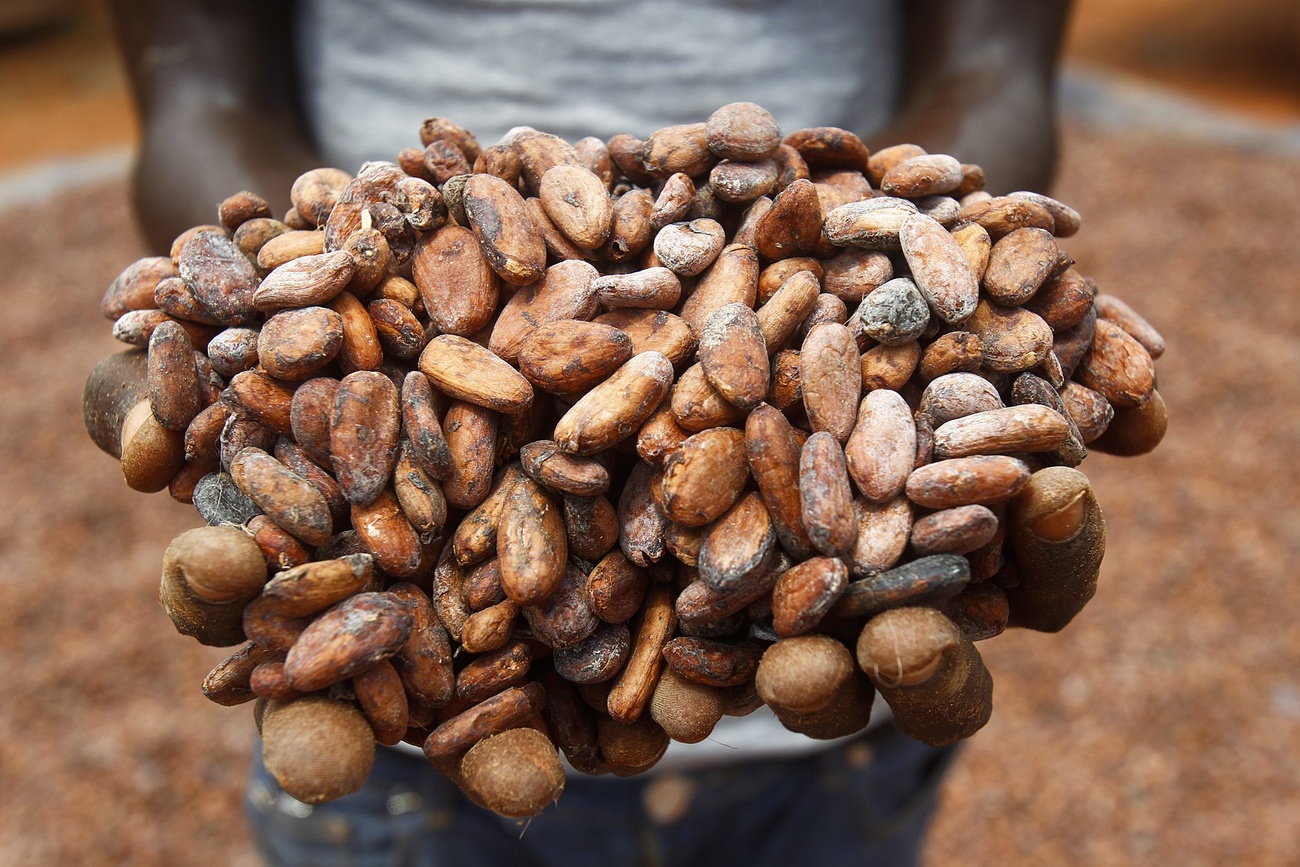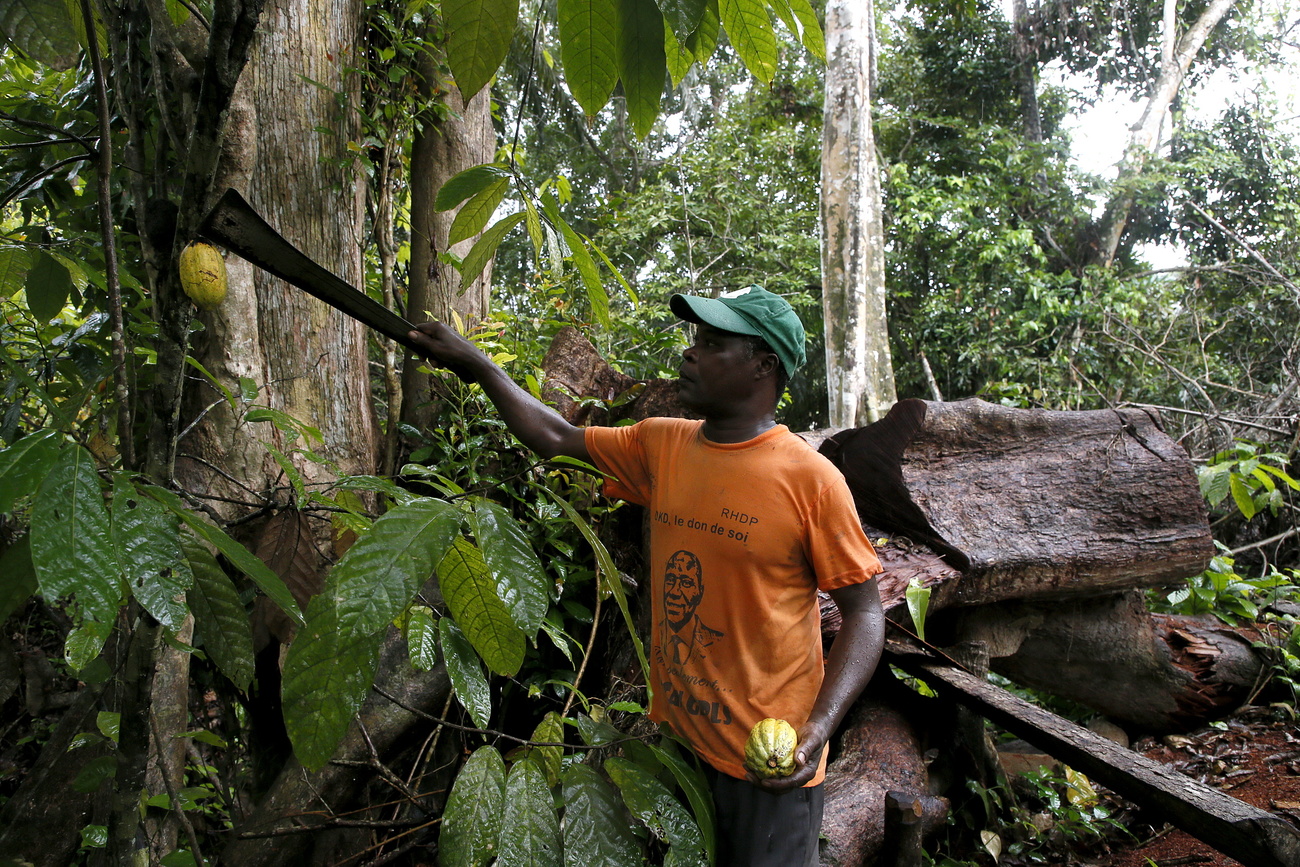
West Africa vs Big Chocolate: Battle over price sours relations

The 100,000 cocoa farmers Frank Okyere represents as head of Ghana’s Kuapa Kokoo co-operative eke out hardscrabble lives despite producing the raw material for a global chocolate industry worth an annual $100 billion (CHF88 billion) in retail sales.
The world’s two largest cocoa producing countries, Ivory Coast and Ghana, have added a supplement to the sale price in an effort to alleviate poverty. But a dispute over whether global buyers were prepared to pay illustrates how hard it will be for the two nations to control and lift prices in an industry dominated by millions of smallholders.

“We are not asking too much from industry, just meet our cost of production and help us get something small to live,” said Mr Okyere. “I don’t think it’s too much to ask, because once they do that they can still make big profits.”
The disagreement centred on a $400-a-tonne “living income differential” (LID) added to the price of cocoa harvested from this crop year, bought from Ivory Coast and Ghana, which account for 60% of global production. In the past few years they have collaborated to try to raise the share farmers earn — just 6.6% of the sale price of a bar of the confectionery, according to the Cocoa Barometer, published by Voice Network, an umbrella group for 17 non-government organisations.

More
Chocolate makers face reckoning over persistent child labour challenge
In letters circulated in the industry, the Ivorian Conseil du Café-Cacao and the Ghana Cocoa Board this month accused the chocolate producers of trying to avoid the LID after US group Hershey took the rare step of sourcing cocoa beans from the futures market in New York. Analysts said this meant it did not have to pay the supplement, although Hershey said it was supportive of improving farmers’ livelihoods. Buyers normally purchase the commodity from traders that source directly from Ghana and Ivory Coast.
Authorities in both nations responded by banning the company from operating sustainability programmes on their soil — initiatives businesses are keen to support amid increasing global focus on sustainability and issues such as deforestation and child labour. While the chocolate producer’s commitments to pay the LID ended the dispute, it demonstrated the limited leverage held by producers.
Ivory Coast and Ghana sought to punish Hershey by suspending programmes despite their benefits for farmers, said Kobi Annan, Accra-based consultant at Songhai Advisory, a business intelligence firm.
By cancelling the initiatives, they wanted to hold more cards “when we sit down and solve this big problem: why do countries who produce 60 per cent of a commodity have no real power in setting its price?”
But ultimately, said a Ghanaian official speaking on condition of anonymity: “Your negotiating position is not that strong, so you’re entirely dependent on public sentiment, environmental sustainability concerns, child labour concerns, income inequality concerns, to make the other party feel a little guilty so they contribute more.”
Part of the problem is that rising farmgate prices — set by the government — and an increase in sustainability programmes have encouraged millions of small farmers who are desperate for cash to produce more, weighing on market prices.
This year, an election year in both countries, governments jointly raised the price by about 20 per cent to $2,600 a tonne, still $500 less than the Cocoa Barometer estimates farmers need to earn a living wage.
Global cocoa output has grown 18 per cent over the past five years to 4.7 million tonnes, with top producer Ivory Coast producing 2.1 million tonnes in the last crop year, up almost a third, according to the International Cocoa Organisation of producing and consuming countries. Ghana produced 800,000 tonnes, up 3 per cent.
“If you want [world] prices to rise, you do not produce considerably more than the market needs,” said Derek Chambers, former head of cocoa at French trader Sucden.
There is now rising concern that Ivory Coast and Ghana will be left holding unsold cocoa in a year when the harvest is expected to be at record levels, analysts say.
As a result of lower global demand and the LID, sales agreements in the two countries for this crop year and next are far below normal, said Jonathan Parkman at commodity brokers Marex Spectron.
Deals covering about 70 per cent to 80 per cent of their crop for the current year and about 5 per cent for the following year compared with normal years, where both would have sales agreements for all their current year cocoa and about 20 per cent to 25 per cent for the following year’s harvest, he said.
Mr Parkman said there was frustration among buyers over a lack of transparency and accountability around the LID operation. “The LID is going to have to be reformed. It’s not sustainable as it is over time,” he added.
Antonie Fountain of the Voice Network said some of the confectionery groups were putting profits ahead of farmers’ wellbeing.
But brokers and analysts said efforts by Ivory Coast and Ghana to collaborate and control prices would struggle — partly because of smallholders’ desire for cash and rival producers’ ability to expand market share.
“It’s a very difficult situation,” said Bright Simons, a researcher at Ghanian think-tank Imani. “Ultimately cartels struggle in commodities,” he added. “That’s the lesson of the last couple of decades.”
Copyright The Financial Times Limited 2020

More
The pioneers of Switzerland’s ‘Chocolate Revolution’

In compliance with the JTI standards
More: SWI swissinfo.ch certified by the Journalism Trust Initiative





























You can find an overview of ongoing debates with our journalists here . Please join us!
If you want to start a conversation about a topic raised in this article or want to report factual errors, email us at english@swissinfo.ch.